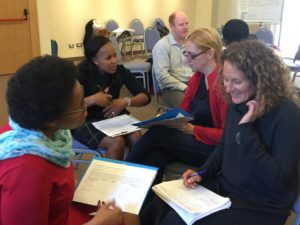
A familiar saying, designed, I’m sure, to belittle those in the teaching profession says: “Those that can, do. Those that can’t – teach!” Ouch – go all the teachers.
Fine, we can take it – it might even be true. But what happens when those superhuman “doers” are required all of a sudden to teach? When they are required to transfer new content, skills or business models and approaches to their subordinates? What are you going to do? Fill 50 slides with text from the project document, fire up the projector and torture your team for 3 days? In many cases the answer to that is a resounding yes – you see it happening in the public and private sectors every day of the week just by taking a stroll around those trendy buildings with glass walls in the meeting rooms!
There is a huge difference between sharing content and teaching. The face-to-face classroom environment is a wonderful opportunity to persuade and train participants but you need to know what you are doing.

Group work during a training session
Adult learners are a fickle bunch. Treat them like kids at school by chaining them for 6 hours a day to their desks and they too will revert to type – revisiting all those diversions and distractions that served them so well during Friday afternoon double geography, with the added benefits of modern day smart phone technology to keep them amused and switched off.
Adult learners need to understand critically why they need to know or do something. Start with the “why”, not merely the “what”. Connect your training to their working reality. Deliver your training by involving your participants in every 45 minute section.
All of this takes planning and preparation. You need to be able to engage your audience. The experience the audience has in the classroom will dictate the success of your training and the future of the project. Adults need to understand the sequence and
direction their training is taking. The areas to be covered must be prioritised and delivered in chunks with each session designed to activate the thinking, intuition and insight in the classroom. A trainer must learn to stop talking and switch the focus away from themselves and slides on the wall to the real world of those in the room.
How good are non-teachers at giving instructions, setting up an activity that
works, structuring a session so that it meets its objectives and actually finishes on time (or preferably early)? Without training, the answer is “not very good”. A subject expert required to become a trainer usually knows far too much about the issue than is required and then attempts to shovel all that content down the throats of those present with devastatingly painful results. I don’t blame them – they often simply don’t know what else to do.

Pairs reflecting and planning
A good training of trainers course will firstly convince future trainers that adults learn differently. It should then transfer a series of skills and techniques that will enable a new trainer to inspire those they are destined to train. Presenting and facilitation skills are paramount. An effective presenter knows how to lead the room (not follow text projected on a screen). They know how to take the room from the complexity of the topic being addressed to the day-to-day reality the trainees will encounter. A good presenter will always be giving direction, will vary the type of activity: from mini lecture to discussion, to paper-based consolidation. They will use powerful visuals and visual imagery as well as pertinent and enjoyable media clips, seeking every opportunity to capture and keep the attention and imagination of those in the room.
The trainer will also understand facilitation techniques, knowing when to ask questions, which questions to ask and when to stay silent – as the audience too has rights – gradually empowering the room to challenge and absorb the new topic until they own it.
If teachers, and in this case teacher trainers, didn’t serve a purpose then we could all learn quite successfully from a good selection of text books with minimum human interaction. But it is the contention of this teacher that there is still space in the classroom to lead and inspire a group to face new challenges and genuinely benefit from taking part in the training whatever the subject matter.
We are not yet a dead breed – so if you need to step up and become a teacher for a day and you would prefer not to be found wanting or boring, get yourself a good course and be ready to be amazed by what you can achieve.
